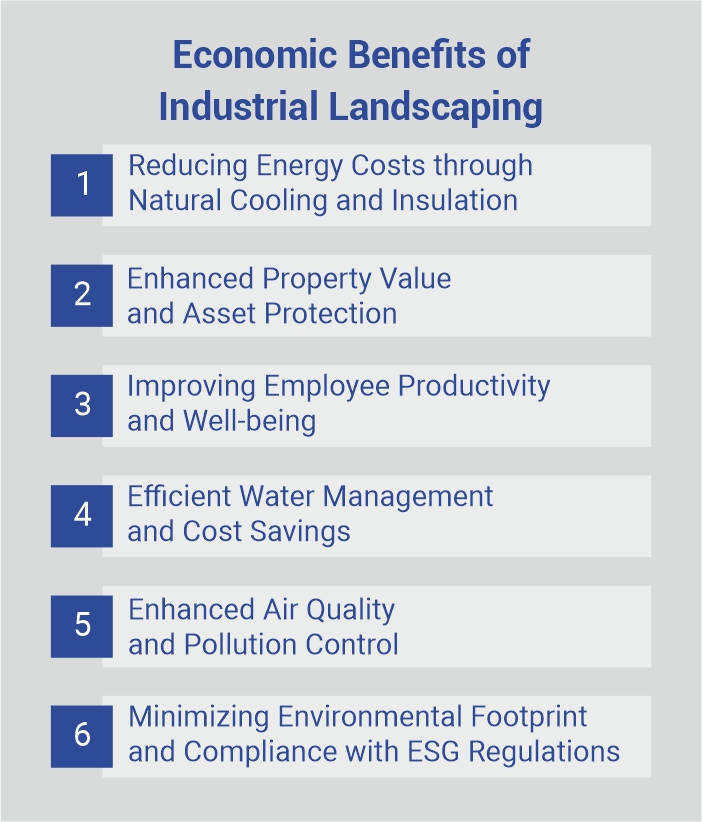With rising industrial development across India, the integration of Environmental, Social, and Governance (ESG) principles into business practices has become essential for companies looking to foster sustainable growth. One often-overlooked aspect of ESG in industrial spaces is horticulture and landscaping, which not only enhances environmental quality but also provides substantial economic benefits. Investing in industrial horticulture and landscaping through a dedicated horticulture service company helps Indian industries achieve multiple ESG objectives while yielding significant cost savings, boosting productivity, and strengthening community relations.
In this blog, we’ll explore the economic benefits of industrial horticulture & landscaping, particularly in the context of India’s unique environmental and industrial landscape, and highlight how a horticulture service provider company like FFServices can support these goals.
Economic Benefits of Industrial Landscaping
Industrial horticulture & landscaping services involves the purposeful use of green spaces, plants, and natural elements to improve industrial sites. In addition to its visual and environmental benefits, a well-designed and well-maintained landscape creates economic advantages for industries by reducing energy costs, enhancing employee productivity, and ensuring long-term financial savings.

1. Reducing Energy Costs through Natural Cooling and Insulation
India’s hot climate can place a heavy energy burden on industrial facilities, particularly for cooling. Horticulture and landscaping solutions can help alleviate this by strategically using greenery to provide natural shade and cooling. For instance, trees planted near buildings shield them from direct sunlight, lowering indoor temperatures and reducing the need for air conditioning. A study by the Indian Green Building Council (IGBC) suggests that strategic landscaping can cut energy costs by up to 30% in certain climates, making it a highly cost-effective measure for industrial sites.
Additionally, green walls and roofs act as natural insulators, maintaining internal temperatures during both summer and winter. This energy-saving approach helps companies lower operational costs and contributes to their commitment to environmental sustainability—a core aspect of ESG.
2. Enhanced Property Value and Asset Protection
In a competitive real estate market, a well-maintained landscape adds substantial value to an industrial property. Green spaces make sites more attractive to potential investors, clients, and even employees, boosting the overall appeal and marketability of the property. Moreover, vegetation can help protect structures from harsh weather conditions. Trees and plants act as windbreaks, which can mitigate damage from seasonal storms and prevent soil erosion, further protecting the facility's foundations.
In India’s dense industrial hubs, the additional property value brought by landscaping is considerable. Companies investing in horticulture and landscaping see not only an improvement in their asset value but also long-term savings from reduced repair and maintenance needs.
3. Improving Employee Productivity and Well-being
Industrial spaces are often associated with pollution, noise, and high stress, all of which can impact employee well-being. Integrating green spaces within these areas provides employees with access to natural surroundings, improving mental health and reducing stress. Studies show that exposure to greenery enhances cognitive function, mood, and focus, leading to improved productivity and lower absenteeism.
In India, where work-related stress is common, especially in industrial sectors, providing green spaces offers a proactive way to enhance employee satisfaction and retention. This aligns with the “Social” component of ESG, demonstrating a company’s commitment to employee welfare. Reduced absenteeism and improved productivity translate into economic benefits for businesses, making landscaping a smart investment with immediate and long-term gains.
4. Efficient Water Management and Cost Savings
India’s climate is characterized by heavy monsoon rains and extended dry periods, making water management a critical issue for industrial facilities. Horticulture and landscaping in India plays an important role in rain-water management. Trees, shrubs, and native plants help absorb and filter rainwater, reducing runoff and preventing soil erosion. Bioswales, rain gardens, and retention ponds within industrial landscapes offer cost-effective solutions for managing excess water.
By incorporating rainwater harvesting and native drought-resistant plants, companies can save on water costs while also contributing to water conservation—a key issue in India’s ESG landscape. This proactive approach not only reduces maintenance and repair costs associated with storm-water damage but also aligns with India’s larger environmental sustainability goals, supporting companies’ regulatory compliance and reducing the risk of penalties.
5. Enhanced Air Quality and Pollution Control
Industrial areas are often located in regions with high levels of air pollution, particularly in rapidly developing countries like India. Plants and trees in industrial horticulture and landscaping serve as natural air purifiers, capturing dust, pollutants, and harmful chemicals from the air. This improves the air quality around industrial facilities, creating a healthier environment for employees and nearby communities.
Cleaner air reduces the need for high-capacity HVAC systems, lowering energy consumption and extending equipment lifespan. For companies operating in regions like Delhi-NCR or Mumbai - where air quality regulations are tightening - landscaping provides a practical and cost-effective way to address pollution concerns, maintain compliance, and uphold ESG standards.
6. Minimizing Environmental Footprint and Compliance with ESG Regulations
With India’s focus on sustainability and increased ESG regulations, industrial facilities are under growing pressure to reduce their environmental footprint. Landscaping contributes by fostering biodiversity, supporting native species, and creating sustainable habitats within industrial areas. Many horticulture service providers design landscapes that use native plants requiring minimal maintenance and fertilizers, reducing environmental impact and lowering maintenance costs.
Furthermore, landscaping practices such as composting and using organic fertilizers help minimize waste, contributing to waste reduction targets that are part of many ESG frameworks. Adhering to these practices ensures compliance with Indian environmental regulations and helps companies avoid non-compliance fines.
ESG Alignment and Industrial Horticulture & Landscaping in India
For Indian industries, adopting landscaping as an ESG strategy offers a holistic approach to sustainability that benefits both the environment and the business. Industrial horticulture and landscaping aligns with key aspects of ESG, as it:
- Protects Local Ecosystems and Supports Biodiversity: Through the use of native plants, landscaping supports local biodiversity, reducing the ecological footprint of industrial activities.
- Improves Community Relations: By creating visually appealing, pollution-reducing landscapes, companies demonstrate responsibility to the surrounding community, building positive relationships with residents and local governments.
- Enhances Corporate Reputation: Businesses that invest in landscaping and other ESG initiatives position themselves as responsible and forward-thinking, which can attract investors and customers.
- Contributes to Regulatory Compliance: Companies benefit from landscaping by reducing pollution and conserving water, meeting or exceeding India’s environmental regulations and strengthening their ESG score.
How FFServices Can Contribute to Your ESG Goals with Industrial Landscaping and Horticulture Solutions
FFServices is committed to helping companies in India realize the economic and ESG benefits of industrial horticulture and landscaping through our comprehensive horticulture and landscaping services. With our expertise, companies can create sustainable landscapes that enhance their operational performance, reduce costs, and demonstrate a commitment to environmental stewardship.
1. Customized Landscaping Solutions for Energy and Cost Efficiency
FFServices offers customized horticulture & landscaping solutions that optimize energy usage, enhance natural cooling, and reduce heating and cooling expenses. Our approach involves assessing each industrial site to strategically place trees, shrubs, and green walls that maximize shade and insulation, helping you achieve significant energy savings and reduced operational costs.
2. Water-Efficient Landscaping and Rainwater Management
We prioritize sustainable water practices by using native, drought-resistant plants and installing efficient irrigation systems. Our rainwater management techniques, including bioswales and rain gardens, mitigate storm water runoff and reduce water expenses. FFServices’ commitment to water conservation helps clients reduce their environmental impact while saving on water-related costs.
3. Enhancing Employee Wellness through Green Spaces
FFServices believes that green spaces are essential to employee well-being. Our horticulture and landscaping solutions focus on creating accessible, serene outdoor areas that reduce stress, enhance productivity, and boost morale. We understand the importance of employee satisfaction to a company’s success, and we design landscapes that contribute to a positive, healthy work environment.
4. Pollution Mitigation and Sustainable Waste Management
FFServices uses eco-friendly landscaping practices that support pollution reduction and sustainable waste management. From using organic fertilizers to establishing composting systems, our landscaping methods help purify the air around industrial sites and minimize waste, reinforcing your commitment to the environment and regulatory compliance.
5. Supporting ESG Goals with Eco-Friendly Practices
Our approach to horticulture and landscaping is rooted in ESG principles. We design landscapes that support biodiversity, using native plants and creating habitats for local wildlife. With FFServices, your company can build a green, sustainable landscape that not only enhances its ESG score but also makes a visible impact in the community.
Conclusion
Incorporating horticulture and landscaping as part of an ESG strategy is a powerful step toward achieving economic and environmental sustainability. With the support of a trusted horticulture and landscaping service provider like FFServices, companies in India can unlock the economic benefits of green spaces while reinforcing their commitment to environmental responsibility, employee well-being, and community engagement. Our solutions offer tangible cost savings and improved operational efficiency, making FFServices the ideal partner for any company seeking to enhance its ESG performance through industrial horticulture and landscaping.
Invest in sustainable industrial horticulture and landscaping with FFServices and transform your facility into a greener, more productive, and economically resilient space that supports your ESG vision for the future.
Industries we serve:
Automobile | Manufacturing | Pharmaceutical | Oil and Gas | Healthcare | Ancillary | FMCG | Education | Real Estate | Commercial | Mining | Hotels
Also read: Streamlining Operations with IFM Services

